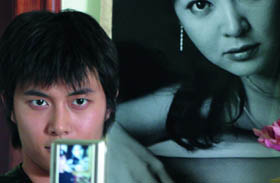Ki-Duk explores a cinema hardly in need of subtitles.
Like the phenomenal hands of golfer Tiger Woods, director Kim Ki-Duk has perfected his own stroke with a distinctive and intoxicating recent stretch of critically appraised award-winning films which are a testament to the director’s absorbing, seducing and highly original cinematic style. Art-house audiences will find that 3-Iron is less detailed than Spring, Summer, Fall, Winter … and Spring and far less ambiguous than Samaritan Girl, but once again the South Korean filmmaker paints a beautiful sketch – offering a soul-searching expedition interrupted by a mischievous unexpected love and unconventional violence.
Sporting an oddly curved beak, the hardest iron to hit with in a bag of clubs is perhaps the three-iron. Perhaps not utilized in the realm of Oldboy styled vengeance, when this club is used off-course, it turns into a curious weapon and comically destructive one at that. Set in a section of suburban quarters, the tale is told through the point-of-view of a handsome, muted, young drifter on a BMW motorbike (Jae Hee) with no fixed address. With a habit of breaking and entering, this perfect intruder performs rare fix-it jobs and washes other people’s clothing – but his pattern changes the day he decides to steal someone else’s possession – in the form of a new girlfriend (Lee Seungg-yeon). Dangling viewers in the unconventional, the narrative withholds information – character motivations are kept distant allowing for an untraditional love story shaped in a cataclysm of absurdist, poetic and towards the end, ghostly moments.
Most interesting in 3-Iron is the succession of narrative moments which offer breaking into other people’s houses and how it offers different vantage points on their flourishing relationship – with each picked lock the more trust is given from the abused housewife and when the young man is no longer physically felt, it is his mental-image presence with a bizarre final act that offers viewers the oddest of resolution. With a serene stance and slowed-pacing, Ki-Duk soaks this modestly-budgeted, Venice film festival winner for best Director tale about abandoned homes and neglected hearts with the right dose of chaos, interesting mise-en-scene and unique romanticism.
Viewed in original Korean language with English subtitles.
